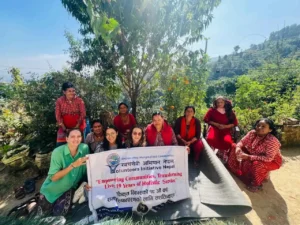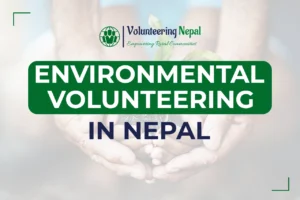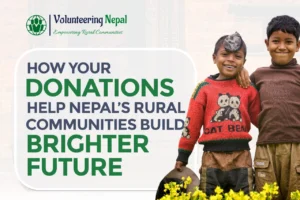
Volunteer Work in Nepal | Life-Changing Opportunities 2025
Volunteering in Nepal gives an individual a rare chance to visit and experience the rich cultural heritage and beautiful landscape of Nepal while contributing to meaningful projects. No matter what area of interest a volunteer chooses, whether in education, healthcare, environmental protection, or women’s empowerment, volunteer work in Nepal offers meaningful opportunities for everyone.
This immersion experience gives volunteers a wide range of community service projects in both urban and rural communities, providing them with practical knowledge to promote both individual and professional.
Why Volunteer Work in Nepal?
Nepal sits in the heart of the Himalayas and offers amazing mountain views. These views attract visitors from all over the world. But Nepal also faces big problems like poverty, poor schools, and weak healthcare. These issues hit harder in remote hills and forested areas. When you volunteer in Nepal, you directly support development and help local people improve their lives.
As a volunteer, you join local events, learn Nepali customs, and live with the community. You don’t just help—you share, learn, and grow. These moments allow you to understand new cultures and make real connections. You leave with powerful memories and friendships that last a lifetime.
You can volunteer in Nepal for 1 to 12 weeks, depending on your time and budget. Groups like Volunteers Initiative Nepal (VIN) guide your work and make sure it brings real change. VIN focuses on helping poor children, supporting communities, and reaching big goals like the UN’s Sustainable Development Goals.
Top Areas for Volunteer Work in Nepal
Educational services are different in format and form in Nepal. There are numerous volunteering projects in the country according to skills and interests. Primary areas include education, public health care services, environmental protection, and women’s empowerment. It provides all the necessary purposes and is very effective for community ownership and development.
Volunteer for education helps students in mathematics, English, and elementary schools. It is located in rural areas and under-resourced secondary schools. Volunteers often serve as assistants in schools, helping to improve the quality of English skills and childhood education. Healthcare programs offer support roles in community hospitals and clinics, where volunteers can work under medical personnel who are already overburdened. Public Health projects are also part of healthcare programs in the country, dealing with broad healthcare topics like hygiene and disease control.
Environment-based volunteer work entails sustainability efforts like community agriculture work, reforestation, and many others. Vocational and health awareness programs for women in low-resource areas are aided by women’s empowerment programs, where counsellors for women focus on contribution to women and gender equality.
Volunteer Teaching Programs
Teaching English and other subjects in Nepali schools is a powerful way to volunteer. Volunteers support curriculum design, content creation, and educational resources. This helps improve education and builds cross-cultural skills. Rural areas especially need teachers due to limited facilities. Volunteers lead workshops to introduce new teaching methods. These include art therapy, storytelling, and cultural sharing. Such activities make the experience more meaningful and impactful.
They teach school animations along with other supporting programs and tricks, which can be taught freely outside the school. PVN Nepal and United Missions work on teaching red tape to develop Nepal (UMD-Naple) and implement the assistance of educational development partners, both students to improve their secondary school and business and help to increase their confidence, heights, and aspirations. Programs are often 2 – 12 weeks or even 4 – 20 weeks, providing enough opportunities for effects.
Gary Zamis, “Teaching at the buddhist monastery has been a wonderful experience. I would highly recommend this for someone with a flexible attitude and an interest in Tibetan Buddhism. One of the best parts is coming away with so many new friends, both monks and teachers.”
Healthcare and Medical Volunteering
An absence of medical services in rural areas is an issue that healthcare volunteer work in Nepal aims to resolve. Clinical, nursing, and public health volunteers can aid significantly by working in busy city hospitals, clinics, and community centres. These community-level interventions are central to the country’s efforts to improve healthcare access in one of the poorest countries in the region.
Participants take part in various activities that include checking the health status of individuals, providing vaccinations, and teaching hygiene and disease control measures to the community. Structured sharing programs, like those offered by Volunteer Nepal, allow medical professionals to give their time in an orderly framework. Volunteers may also work in internship programs or general International Development Internship tracks.
Also, other voluntary organizations like the Nepal Red Cross Society are very active in the provision of health services, such as eye care and disaster response, where volunteers can participate meaningfully. Volunteers often have to purchase travel insurance to participate in these career-focused internships.
Women’s Empowerment Projects
Empowering women is considered one of the neglected areas, yet very crucial to sustainable development in Nepal. Projects are designed to enable women to focus on improving their literacy, vocational training, and health, thereby creating gender balance, economic self-reliance, and future opportunities for all. Volunteers often help support the lives of women through skill-based training.
Volunteering in Nepal provides an opportunity to conduct workshops on reproductive health, entrepreneurship, and even financial literacy. These programs not only give a boost to women but also enable families and communities to evolve in terms of inclusivity and approach to community empowerment. Volunteers are often described as compassionate people whose efforts support long-term change.
Julia Futche, “Those three months volunteering in VINs Womens Empowerment Program gave me the opportunity to try new ideas and realize my own projects which was a really rewarding experience. Teaching English to women from 16 – 39 first was challenging because of their different language levels. I could try different methods of teaching and finally made friends with them.”
Environmental and Sustainable Farming Programs
Nepal’s rich nature and ecosystems face harm from pollution, deforestation, and climate change. Environmental volunteer work helps by promoting tree planting, waste management, and sustainable farming. Chitwan District, home to Chitwan National Park, is a key place where volunteers join efforts to protect nature.
Volunteering Nepal invites volunteers to support conservation and teach communities how to care for the environment. These projects build local strength and protect nature for the future. Volunteers usually stay for 2 to 24 weeks in homestays or eco-lodges while working with local people.
Volunteers also help with eco-clubs in schools to teach kids about the environment. They guide fun and useful activities like composting, nature hikes, and eco-camps. These actions help children learn to protect nature from a young age.
Cost of Volunteer Work in Nepal
Volunteering is considered a selfless service, but it does require some financial resources to be spent on accommodation, meals, and program facilitation. For example, VIN charges €550 for a 4-week program and adds an extra €85 per week after that. This helps fund community service volunteers, child sponsorship, and other meaningful community initiatives.
Other organizations, such as Project Volunteer Nepal, offer no-cost volunteering programs, asking only for personal living expenses. It is important to pick a program that suits your ideals and will not break your bank. Most program fees include country airport transportation, food, and orientation with your contact person or country coordinator.
Volunteers should review all fees and what they encompass with respect to the program, as transparency is crucial in selecting a volunteering project. Ensure that your donations do, in fact, help the community sites and project sites you are targeting.
How to Choose a Trusted Volunteer Program
It is best to select a credible organization so that you can get the most out of your volunteer experience in Nepal, considering it is ethical. Check for NGOs that are under the registration of the Social Welfare Council of Nepal since they supervise and control social organizations within the country. Good programs are often deployed in community centres, child care centres, or community hubs.
Check if they have links with other international organizations like the United Nations Volunteers, as they work with local stakeholders to enhance volunteerism all over the world. Such programs may also include construction internships, child protection training, or customer service skills programs that build your resume while giving back.
Checking the reviews on Go Overseas or similar sites can assist you in making a more educated decision based on the testimonials given by other volunteers. Many of them share stories of their extremely rewarding and life-changing experience, often tied to accommodation upgrades or unique country activities such as week yoga or visits to Hindu temples.
Real Impact Stories from Volunteers
Volunteers tend to share how their lives were changed when they travelled to Nepal for various volunteer programs. For instance, VCD Nepal participants have transformed their views towards the locals and Nepalese people and have established deeper connections with them.
World packers volunteers have partaken in multiple projects ranging from teaching to environmentalism, which not only helped them but also progressed modern society and aided in their personal development. This amazing life experience helped them build English proficiency, become better caregivers at child care, and work in child development programs for the care of street children.
The narrative goes both ways; volunteering affects both volunteers and communities positively. A three-month placement can transform someone’s worldview while creating a positive impact in a beautiful country with a vibrant culture and a bustling city like Kathmandu—the capital city.
FAQs About Volunteering in Nepal
Q1: Do I need prior experience to volunteer in Nepal?
Not having relevant experience is not an issue in most cases. Certain programs, like teaching English to foreigners, have very few requirements.
Q2: What is the typical duration of volunteer programs?
Programs range from one week to several months, depending on the organization’s offerings and volunteer availability.
Q3: Are there age restrictions for volunteers?
While most programs are open to adults, some may have specific age requirements. It’s best to consult with the organization directly.
Q4: Is it safe to volunteer in Nepal?
Yes, Nepal is generally safe for volunteers. Organizations like VIN provide orientation and support to ensure volunteer safety.
Q5: Can I volunteer remotely?
Some organizations offer remote volunteering opportunities, such as online teaching or administrative support. Check with the specific organization for available options.
Final Thoughts on Volunteering in Nepal
Participating in volunteering activities in Nepal is deeply fulfilling on a personal level while working to change the surrounding society on a collective scale. By ensuring that one works with genuine organizations, one will be able to experience the diversity of Nepal as they endeavor to serve the people through their respective work.



